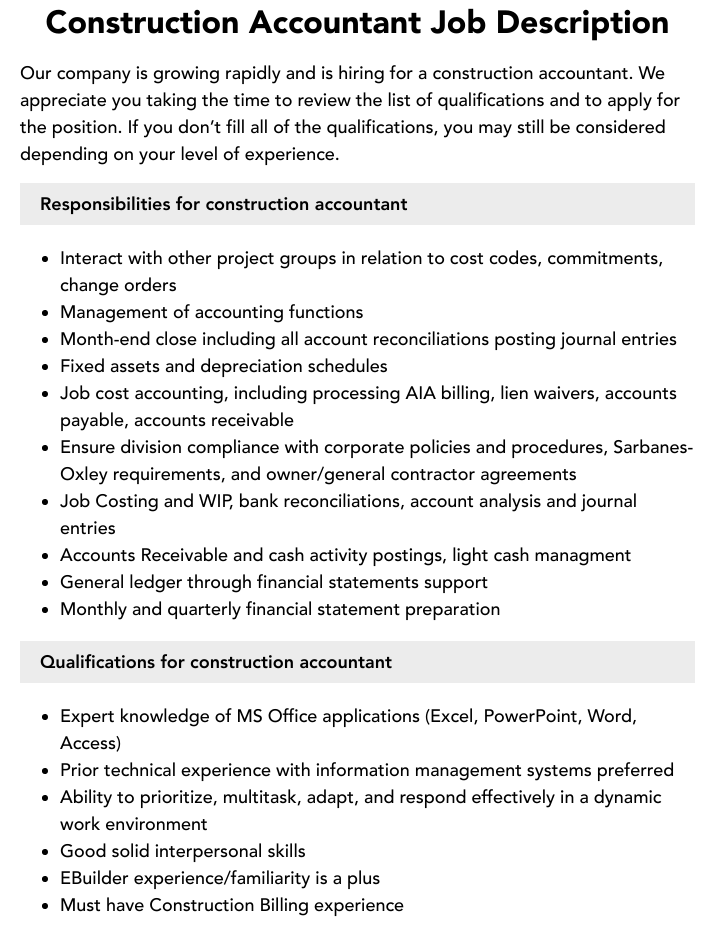Everything about Pvm Accounting
Everything about Pvm Accounting
Blog Article
The Basic Principles Of Pvm Accounting
Table of Contents9 Simple Techniques For Pvm AccountingThe Definitive Guide for Pvm AccountingAll about Pvm AccountingThe 6-Minute Rule for Pvm AccountingSome Ideas on Pvm Accounting You Should KnowThe Definitive Guide for Pvm AccountingPvm Accounting Things To Know Before You Get This9 Simple Techniques For Pvm Accounting
Among the main reasons for carrying out accountancy in building and construction tasks is the requirement for monetary control and monitoring. Construction tasks commonly need considerable investments in labor, products, devices, and other sources. Appropriate bookkeeping allows stakeholders to monitor and take care of these funds efficiently. Bookkeeping systems supply real-time insights right into job costs, revenue, and profitability, making it possible for job managers to immediately identify possible problems and take rehabilitative actions.
Bookkeeping systems make it possible for firms to keep an eye on capital in real-time, making sure sufficient funds are offered to cover expenditures and meet economic responsibilities. Reliable capital management assists prevent liquidity dilemmas and maintains the job on track. https://businesslistingplus.com/profile/pvmaccount1ng/. Construction jobs undergo different financial requireds and coverage requirements. Appropriate bookkeeping makes sure that all financial deals are recorded properly and that the job adheres to audit requirements and legal arrangements.
The smart Trick of Pvm Accounting That Nobody is Discussing
This lessens waste and improves job effectiveness. To much better recognize the significance of accountancy in building, it's also vital to differentiate in between building monitoring audit and task administration accounting.
It focuses on the economic aspects of private construction jobs, such as price estimation, expense control, budgeting, and capital management for a specific task. Both sorts of audit are essential, and they enhance each various other. Construction administration audit ensures the business's economic health and wellness, while task monitoring bookkeeping guarantees the financial success of specific tasks.
Getting My Pvm Accounting To Work

An important thinker is needed, who will certainly deal with others to make choices within their areas of responsibility and to surpass the areas' work processes. The setting will certainly communicate with state, university controller team, school departmental team, and scholastic researchers. He or she is expected to be self-directed once the first understanding contour is conquered.
Some Known Facts About Pvm Accounting.
A Building Accounting professional is accountable for handling the monetary aspects of building tasks, including budgeting, cost tracking, economic coverage, and conformity with regulatory demands. They function very closely with project supervisors, professionals, and stakeholders to make certain accurate monetary records, price controls, and timely settlements. Their proficiency in building audit concepts, project costing, and monetary evaluation is important for efficient monetary monitoring within the construction industry.

Not known Incorrect Statements About Pvm Accounting
As you've most likely learned by now, tax obligations are an inescapable component of doing service in the United States. While many focus generally lies on government and state revenue tax obligations, there's additionally a 3rd aspectpayroll taxes. Payroll taxes are tax obligations on a worker's gross salary. The revenues from pay-roll taxes are used to money public programs; thus, the funds accumulated go directly to those programs as opposed to the Irs (IRS).
Keep in mind that there is an extra 0.9% tax obligation for high-income earnersmarried taxpayers who make over $250,000 or solitary taxpayers making over $200,000. Revenues from this tax go towards federal and state joblessness funds to help employees who have actually lost their work.
How Pvm Accounting can Save You Time, Stress, and Money.
Your down payments must be made either on a regular monthly or semi-weekly schedulean political election you make prior to each schedule year (construction accounting). Monthly repayments - https://j182rvzpbx6.typeform.com/to/qpx4zyP8. A regular monthly payment should be made by the 15th of the complying with month.
So take treatment of your obligationsand your employeesby making full pay-roll tax obligation repayments in a timely manner. Collection and payment aren't your only tax obligation duties. You'll additionally need to report these amounts (and other information) frequently to the IRS. For FICA tax (as well as federal earnings tax obligation), you must complete and submit Type 941, Employer's Quarterly Federal Tax obligation Return.
Some Of Pvm Accounting

Every state has its very own unemployment tax obligation (called SUTA or UI). This is since your company's sector, years in business and unemployment background can all figure out the percentage made use of to calculate the amount due.
The smart Trick of Pvm Accounting That Nobody is Talking About
The collection, compensation and coverage of state and local-level tax obligations depend on the federal governments that impose the tax obligations. Plainly, the topic of pay-roll tax obligations entails plenty of moving components and covers a vast array of accounting understanding.
This internet site uses cookies to enhance your experience while you navigate through the site. Out of these cookies, the cookies that are categorized as required are stored on your browser as they are necessary for the working of standard functionalities of the site. We also use third-party cookies that aid us assess More Bonuses and recognize just how you utilize this internet site.
Report this page